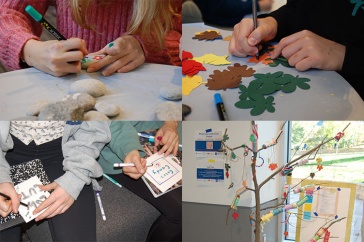
Katie Edwards, assistant professor of psychology and women’s studies, recently was one of a select group of researchers to attend the “1 is 2 Many Teen Dating Violence Awareness and Prevention Month” event at the White House.
Edwards was among a diverse group of approximately 150 individuals, including researchers, advocates, policy makers, leaders from a variety of organizations, school representatives, high school and college students, and family members of victims who were killed by teen dating violence, who gathered Thursday, Feb. 28, 2013, to hear Vice President Joe Biden and senior administration officials discuss the importance of preventing teen dating violence. The event recognized February as Teen Dating Violence Awareness Month.
“Adolescents and young adults experience rates of intimate partner violence higher than any other age group. In fact, nearly one in 10 high school students have been physically hurt on purpose by a dating partner in the past year. Among college students here in New England, 14 percent of young men and women report being physically abused by a dating partner in the past six months,” Edwards said.
“We find equally alarming rates of other forms of intimate partner violence, such as sexual abuse, emotional abuse, and stalking victimization among adolescents and young adults. These staggering rates along with the many negative outcomes associated with being the victim of dating violence underscore the critical need for comprehensive prevention programs and policies,” she said.
In addition to Vice President Joe Biden, the two-hour meeting featured talks by senior administration officials including Lynne Rosenthal, White House advisor on violence against women; Tony West, associate attorney general of the United States; Deb Delisle, assistant secretary for elementary and secondary education; and Valerie Jarrett, senior advisor to President Barack Obama. National representatives from Men Can Stop Rape, adolescents affected by teen dating violence, and parents who had lost children to teen dating violence, also spoke at the event.
“Not only was I honored to be invited to attend this event, but I left with a renewed sense of hope that together we can end teen dating violence and other forms of gendered violence in our society,” said Edwards, who also is a faculty fellow at the Carsey Institute.
Edwards’ research focuses on primary prevention of intimate partner violence as well as how to best assist survivors in their recovery. Edwards is especially interested in studying intimate partner violence among understudied and marginalized populations, and thus her current research focuses mostly on LGBTQ youth and rural youth. The ultimate goal of Edwards’ work is to utilize research data to implement effective prevention and intervention efforts and advocate for legislative policy and social change.
UNH has long been regarded as a leader in addressing violence against women on campus. In 1988, the university began funding the Sexual Harassment and Rape Prevention Program, one of the country's first on-campus crisis centers to provide comprehensive confidential direct services and prevention programming to UNH students, faculty and staff.
In 2010 three UNH faculty members who research violence against women and develop effective programs to address it on college campuses were invited to brief the White House on their work and attend a reception at the residence of Vice President Biden to celebrate the 16th anniversary of the passage of the Violence Against Women Act. UNH also has a nationally and internationally recognized Bringing in the Bystander™ program, administered by UNH Prevention Innovations. It is being used at a number of institutions of higher education and other organizations throughout the United States and emphasizes bystander intervention and emphasizes that everyone has a role in ending violence against women.



















































